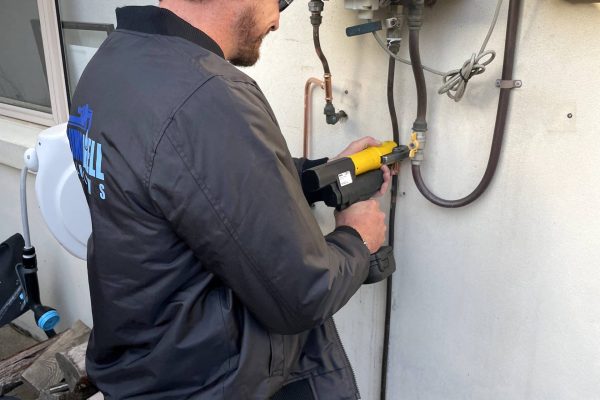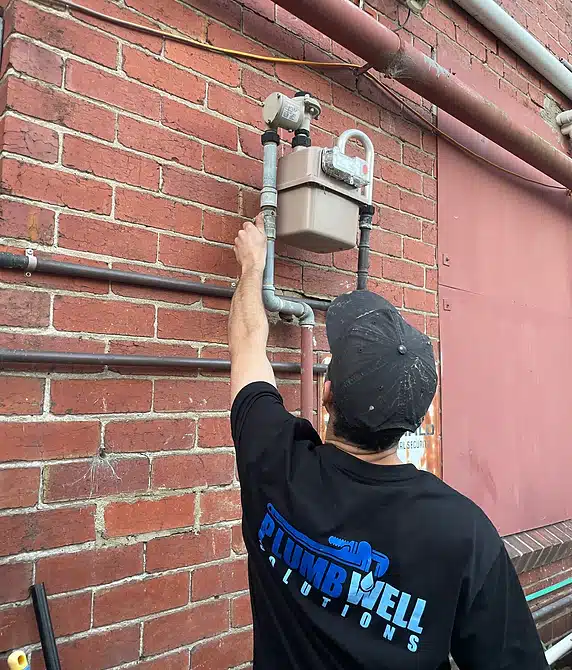Hot water systems are a mainstay in homes across Bayside Melbourne, but deciding on gas or electric hot water can be a challenge. Whether you’re installing a new one for your property or replacing an old one, both of them do a good job at heating water. Each does have unique advantages.
The type you choose comes down to the benefits you value the most and your home’s specific needs.

Differences Between Gas and Electric Hot Water Systems
Feature
Gas Hot Water System
Electric Hot Water System
Costs
Higher initial cost and low running cost as natural gas is cheaper than electricity
Lower initial cost and high running cost due to off-peak tariffs for electricity (You can offset running cost with solar panels)
Installation
Expensive and complex installation process
Quick, cost-effective installation process
Efficiency
Less efficient due to energy and heat loss, as well as continuous pilot flame
Efficiently uses energy to heat water
Size
Available in storage tank and continuous flow gas systems
Available in conventional tank and continuous flow electric hot water systems
Lifespan
Lasts several years with adequate maintenance
Lasts longer than gas water heaters due to clean operation
Maintenance
Maintenance needed every few years for tank systems, as well as inspections for gas lines
Maintenance needed every few years for tank systems
Feature
Gas Hot Water System
Costs
Higher initial cost and low running cost as natural gas is cheaper than electricity
Installation
Expensive and complex installation process
Efficiency
Less efficient due to energy and heat loss, as well as continuous pilot flame
Size
Available in storage tank and continuous flow gas systems
Lifespan
Lasts several years with adequate maintenance
Maintenance
Maintenance needed every few years for tank systems, as well as inspections for gas lines
Feature
Electric Hot Water System
Costs
Lower initial cost and high running cost due to off-peak tariffs for electricity (You can offset running cost with solar panels)
Installation
Quick, cost-effective installation process
Efficiency
Efficiently uses energy to heat water
Size
Available in conventional tank and continuous flow electric hot water systems
Lifespan
Lasts longer than gas water heaters due to clean operation
Maintenance
Maintenance needed every few years for tank systems
Gas Hot Water Systems For Large Homes
Pros
Heats Water Faster
The biggest advantage of installing a gas hot water system for a large home is that it heats water faster. It’s quicker than electric models. Your home has a steady supply of hot water, especially during peak times, like when everyone is getting ready in the morning.
Lower Running Costs
Another major advantage of using gas water heaters is that they have a lower running cost than electric systems. This is if you don’t have solar panels and pay different charges for peak and off-peak times.
Get Hot Water Instantly
Even if you live in a small home and frequently need to use hot water for hygiene, cleaning and cooking, tankless gas-powered systems do a great job at supplying it instantly. By providing hot water on demand, tankless heaters eliminate the need for a storage tank.
Cons
Higher Installation Costs
The most common disadvantage of choosing a gas-powered hot water system is that installation costs more. As it requires fitting a new gas line, installation is more complex than electric systems, making it more expensive.
Potential Safety Concerns
When installed properly, gas hot water systems have low risk of safety concerns. Nevertheless, there are still concerns about improper ventilation and cases of malfunctions. That’s why experts recommend servicing your gas hot water system regularly.
Low Efficiency
Unlike continuous flow hot water systems, gas hot water systems with storage tanks continuously run a pilot flame. This means they’re always using some gas to heat water.
Increased Space Requirements
Gas-powered hot water systems need more space for venting and gas lines. In contrast, electric systems are more compact even when they also need space for a tank.
Electric Hot Water Systems For Large Homes
Pros
Affordable (if Powered by Solar Panels)
If your home is powered by solar panels, an electric hot water system can be an affordable choice. Aside from the lower installation cost, your electric hot water system will also cost less to run than a standard gas hot water system.
Lower Installation Cost
Because electric hot water systems don’t require you to set up a gas line, the cost of installation is much lower and quicker. You save time and get back to your routine without delays.
Better Energy Efficiency
Electric hot water systems offer impressive energy efficiency ratings, as they only use power when hot water is being used.
Cons
Slow Heating Mechanism
Electric hot water systems are much slower than their gas-powered counterparts. Because they take longer to heat water, you’re likely to experience delays in hot water availability. This is especially the case if you live in a bigger home.
Greater Operating Costs
If your home isn’t powered by solar panels, the cost of running electric hot water systems can be more expensive than a gas-powered system. That’s because electricity is more expensive in various areas, resulting in higher operating costs
How to Choose the Right System For You
- Household Size and Water Usage: Gas powered hot water systems are better for larger homes that constantly need a hot water supply.
- Budget: Gas can offer long-term savings with a higher upfront cost, while electric is cheaper to install, with higher utility bills if you don’t have solar panels.
- Location: If your property gets plenty of sunlight, solar can be a good option for powering an electric hot water system. Some locations might also be easier or harder to connect to a gas line, which brings to the next bullet.
- Access To Gas: Not all homes are connected to gas, so powering your system with solar panels makes you less dependent on natural gas
Hybrid Systems: Combining The Best of Gas and Electric Systems
While your two main options include a gas and electric hot water system, it’s also possible to install both. Larger properties like yours can benefit from having more than one system.
It allows you to enjoy the benefits of both gas and electric-powered systems depending on energy costs and solar power availability.
It also means you’re not entirely reliant on one type of system for your hot water needs.

Installation Strategies For Hot Water Systems
- Recirculation: Local plumbers install a hot water recirculation loop so you immediately get hot water at all fixtures, reducing waiting time and water waste.
- Multiple Units: Plumbers install multiple small units or point-of-use heaters in high-use areas like bathrooms and kitchens to deliver a consistent supply of hot water and prevent straining a single system.
- Zoning: This installation strategy involves dividing the large property into zones, with each one having its own water heater, improving efficiency and performance.
Incentive For Energy Efficient Systems
With the hot water rebate, administered by the Victoria Government, gives Victorian households a rebate of up to $1000 to purchase an eligible solar hot water system or heat pump.
Plumb Well Solutions For Expert Hot Water Repairs Bayside Melbourne
As gas and electric systems have their pros and cons, you can choose between the two or get a combination of both to suit your needs. As gas-powered tank systems can supply large quantities of hot water instantly, they’re a suitable choice for the main zones with increased usage.
Meanwhile, rooms with low traffic, like guest rooms, can be connected to electric continuous flow systems for improved efficiency. Regardless of the type you choose, consult local professionals, like Plumb Well Solutions to help you pick and install the right system for your home.
